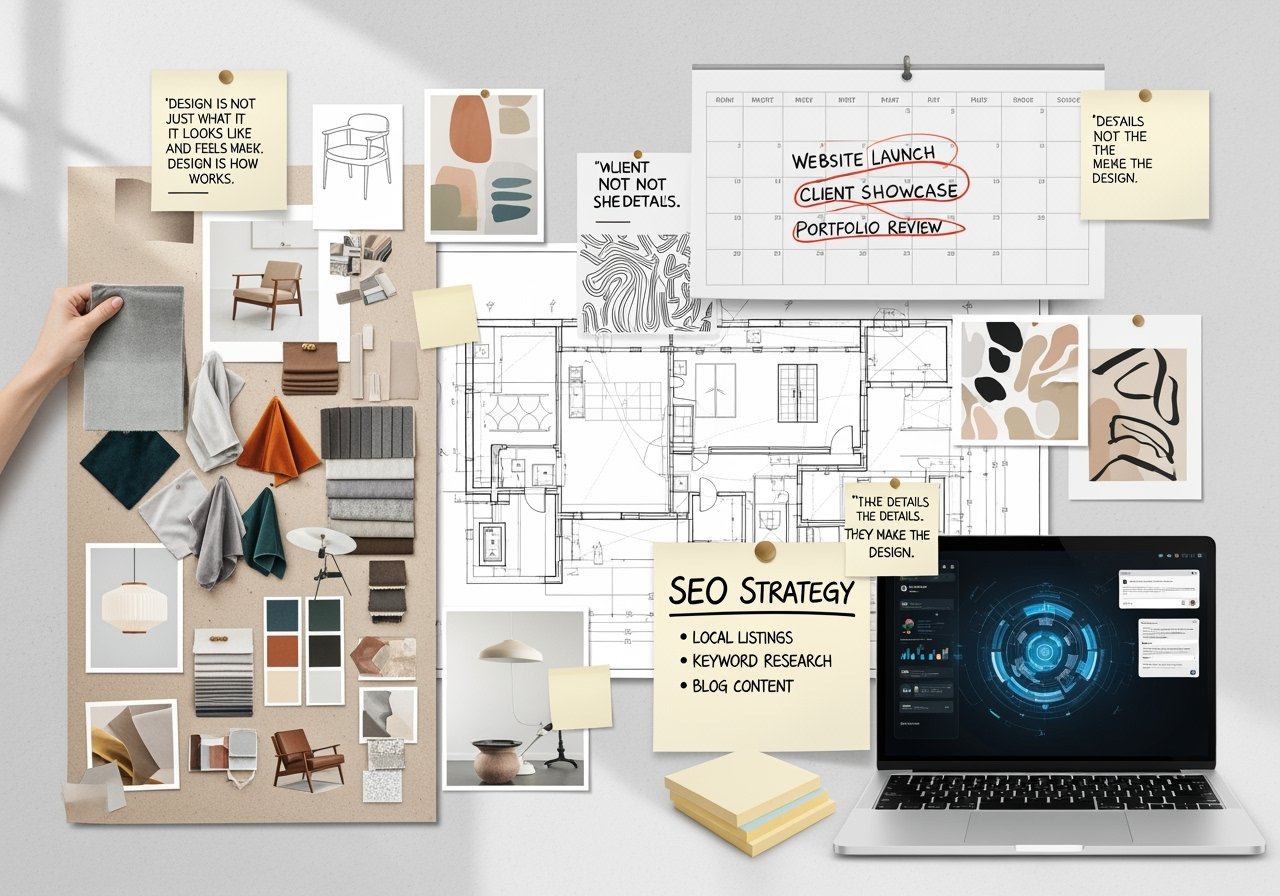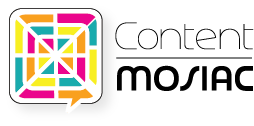Business Planning for Interior Designers: Build Your Dream Studio with Strategy, AI, and Smart SEO

If you’re an interior designer, you know that every beautiful room starts with a plan. The same is true for your business. Whether you’re just starting out or looking to grow your studio, having a clear business plan gives you the direction, confidence, and momentum you need to reach your goals.
But here’s the good news: business planning doesn’t have to be overwhelming or time-consuming. With the right questions, a little structure, and some help from AI tools, you can build a plan that turns your creative vision into a thriving business—without losing your sanity to spreadsheets.
Why Business Planning Matters (Even for Creative Entrepreneurs)
Let’s be honest—most designers didn’t start their business because they love writing business plans. But planning isn’t about paperwork; it’s about clarity and focus. A solid business plan helps you:
- Define your ideal clients: Who do you love working with? What kinds of projects light you up?
- Clarify your services: Are you offering full-service design, e-design, color consultations, or something else?
- Set achievable goals: How many projects or what revenue do you want this year?
- Prepare for ups and downs: A plan helps you weather slow seasons and seize new opportunities with confidence.
Even a one-page plan can set you apart from most designers who are just “winging it.”
Key Questions to Guide Your Interior Design Business Plan
Start by jotting down answers to these questions:
- Who is your ideal client?
Be specific—think about location, style, project size, and even personality traits. Do you love working with busy families, empty nesters, or boutique hotels? - What services do you offer?
List your core offerings and note which ones are most profitable or creatively fulfilling. - What are your revenue and project goals for the next 12 months?
Set a realistic number of projects or income target that motivates you. - What makes your design approach unique?
Is it your process, your signature style, or your client experience? - How will you find and book new clients?
List your top marketing channels—referrals, social media, networking, your website, etc.
These answers are your business blueprint. They’ll guide your daily decisions, marketing, and even the kinds of clients you attract.
How AI Can Make Business Planning Faster and Smarter
You don’t have to do this alone. Today’s AI tools can help you brainstorm, organize, and refine your business plan—saving you time and helping you think bigger.
1. Brainstorming and Market Research
Not sure who your ideal client is, or what services are trending? AI tools like ChatGPT can help you:
- Generate lists of potential client types, design styles, or service offerings
- Research what homeowners in your area are searching for (“eco-friendly kitchen remodel,” “open concept living room”)
- Summarize industry trends or analyze your competitors—so you can spot opportunities
Example prompt:
“ChatGPT, what are the top 5 interior design services homeowners in Dallas are searching for in 2025?”
2. Drafting Your Business Plan
Hate staring at a blank page? AI can help you:
- Outline your business plan (mission, services, pricing, marketing)
- Suggest ways to describe your design approach or value proposition
- Edit your draft for clarity and professionalism
Example prompt:
“Help me write a one-page business plan for a boutique interior design studio specializing in modern farmhouse kitchens.”
3. Setting SMART Goals
AI can help you turn big dreams into clear, actionable steps:
- Break down annual revenue targets into monthly or weekly project goals
- Suggest marketing strategies to reach your goals (blogging, email, partnerships)
Example prompt:
“Based on a goal of booking 12 new projects this year, what monthly marketing activities should I focus on?”
4. Creating Client Personas and Offers
AI can help you define your dream client and craft offers that speak directly to them:
- Build detailed client personas (age, style, needs, budget)
- Brainstorm new service packages or add-ons based on market gaps
From Planning to Action: Your Website Is Your Studio’s Front Door
Once your business plan is in place, your next priority should be your website. In 2025, your website is more than just a digital portfolio—it’s your studio’s front door, your best salesperson, and the foundation of all your marketing.
Why Your Website Matters:
- Credibility: Clients expect to see your work, process, and testimonials before they reach out.
- Lead Generation: A well-optimized site attracts the right clients—even while you’re busy designing.
- Control: Unlike social media, your website is yours. You’re not at the mercy of algorithm changes or platform shutdowns.
Essentials for Your Interior Design Website
- Portfolio: High-quality images of your best work, organized by project type or style.
- About Page: Your story, credentials, and what makes your approach special.
- Services: Clear descriptions of what you offer, who it’s for, and how clients can work with you.
- Contact Form: Make it easy for dream clients to reach out—test it on mobile!
- SEO Basics: Use keywords your ideal clients are searching for, and make sure your site loads quickly.
The Secret Sauce: SEO for Interior Designers
Here’s the truth: Even the most stunning website won’t bring in leads if it’s not optimized for search engines. That’s where SEO (Search Engine Optimization) comes in. SEO is how you make sure your website is discoverable by people actively searching for your services. It’s not about gaming the system—it’s about helping the right clients find you, exactly when they need you most.
Final Thoughts
Business growth doesn’t happen by accident. It starts with a plan, is powered by smart tools (like AI), and is accelerated by a strong digital presence. If you lay the right foundation, you’ll be ready to attract more of the clients and projects you love.
If you have questions about business planning, AI tools, or want a free website audit, feel free to reach out. Here’s to building a business as beautiful and intentional as your designs!
Written by Kari Gustafson
Founder, Content Mosaic
Kari Gustafson is a digital marketing and SEO specialist based in Roseville Minnesota. With a background in account management, content strategy, and localization, Kari is passionate about helping small businesses and creative professionals grow their online presence. She brings a blend of data-driven SEO expertise and creative storytelling to every project, making it easier for service-based businesses in the Twin Cities and beyond to get found, connect, and thrive. Connect with Kari on LinkedIn
